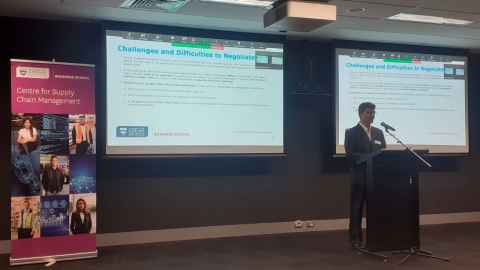Managing Scope 3 greenhouse gas emissions in Supply-Chain
A summary of the Scope 3 greenhouse emissions in supply chains event in 2023

On June 22 last month, the Centre for Supply Chain Management (CSCM) hosted an enlightening event as part of our 'After 5's' series, on Scope 3 greenhouse emissions in supply chains. Our guest speaker was Kar Rahul, a provisional year PhD Student at the University of Auckland. Kar holds a master's degree in environmental engineering and a bachelor's degree in civil engineering. With over 26 years of professional experience spanning various aspects of climate change, sustainability, resilience, and finance, he has a passion for transforming academic research into innovative, practical solutions, especially in relation to supply-chain interactions with sustainability issues.
During this event, Kar painted a vivid picture of the current global market landscape, focusing specifically on regulations (i.e., frameworks and taxes) and existing technology. As the threats of climate change become increasingly severe, regulatory bodies are scrutinizing Scope 3 emissions closely, and businesses are preparing to adapt to new regulations and taxes. Scope 3 emissions are particularly challenging because they encompass emissions not produced directly by the company, nor resulting from activities from assets owned or controlled by them. Instead, they are emissions the company is indirectly responsible for, up and down its value chain. Kar emphasized the unique challenges related to this aspect of emissions accounting and pinpointed the lack of integration and coordinated effort as a major gap in current practices.
Kar highlighted the complexities of the international transportation segment of the supply chain, which is often overlooked when policymakers determine or present decarbonisation ambitions. It's clear from available data that the international maritime and aviation sectors are gearing up to curb emissions associated with commercial operations, which fall under the Scope 3 greenhouse gas (carbon) emissions category. However, progress has been slow, and the boundaries for emissions accounting are often disputed. During his presentation, Kar delved into this contentious topic, discussed the status of negotiations, and outlined what supply-chain logistics participants might expect in terms of evolving regulations that could challenge their bottom line.
We thank Kar for sharing his knowledge and we look forward to the productive conversations his presentation has undoubtedly sparked among our CSCM community.